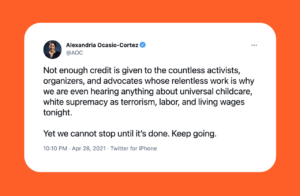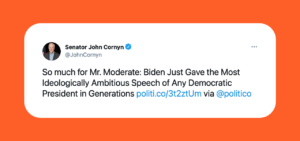What’s Breaking Through? Congressional Reactions, Prioritization, and Digital Amplification
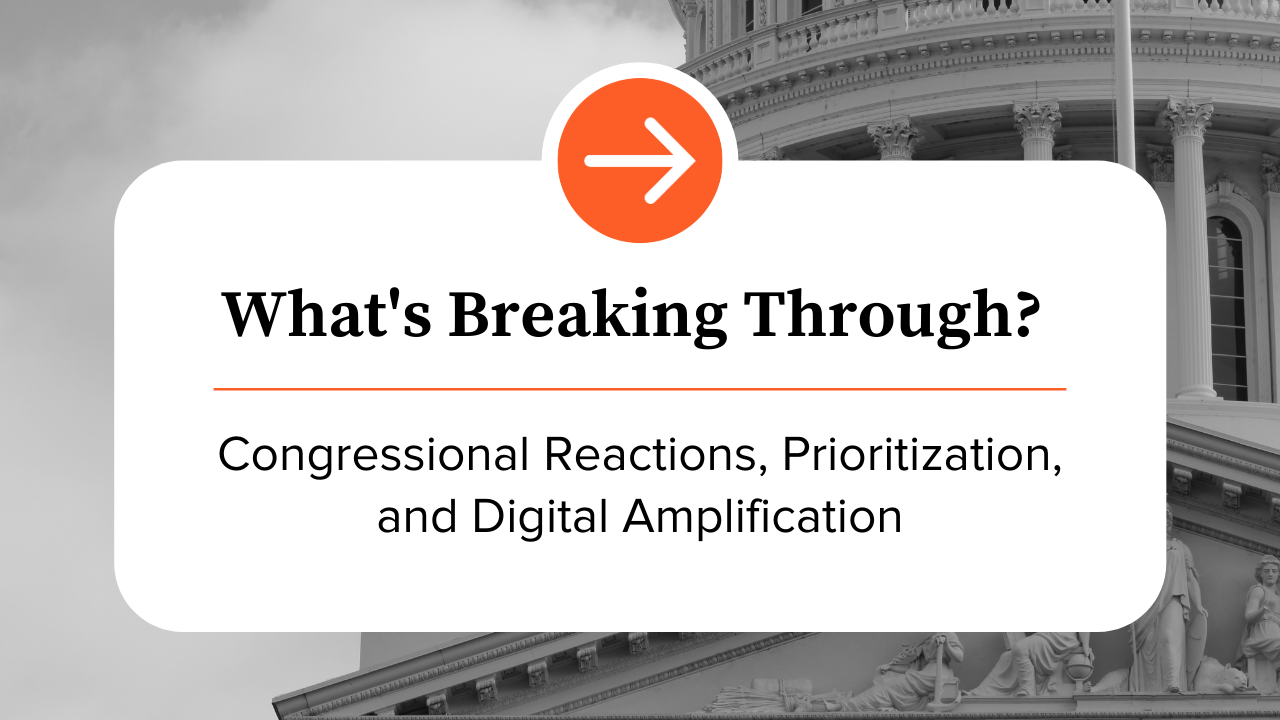
Ever wonder whether bipartisan agreement is gone forever? Or, whether it’s possible for progressives, conservatives, and those in the middle to find common ground on critical issues? Us too.
That’s why we’re diving deep to look at what’s breaking through among three core groups of Senators and Representatives that carry weight across both chambers — Progressives, Conservatives, and Bipartisan Dealmakers* — to understand where the factions exist, identify any hints of agreement, and help predict a path forward on some of the most critical issues.
We’re kicking it off with a look at reactions to President Biden’s address to the Joint Session of Congress. Was it a moment for renewed bipartisanship and a return to unity? What specific proposals in the American Jobs Plan and American Family Plan animated both the critics and supporters? Below we analyze the flurry of reactions on Twitter to understand where each group stands (at least publicly) and offer some predictions on what’s ahead. (And, yes, we know Twitter is not a scientific snapshot of support or dissension on any issue.)
*For our analysis, we counted members of the Congressional Progressive Caucus and key Senators as “Progressives,” members of the House Freedom Caucus and key Senators as “Conservatives,” and members of the House Problem Solvers Caucus and the Senate Gang of 20 as “Bipartisan Dealmakers.”
Tweet spikes! Conservative tweets spiked around mentions of immigration and gun safety:
Conservative tweets spiked during predictable Republican base issues — such as tweets calling out the #BidenBorderCrisis or supporting the 2nd Amendment versus passing universal background checks. However, Conservatives also organized themselves to counter President Biden’s positive narrative around the American Rescue Plan. At the top of the speech, as the President ticked off his accomplishments around vaccine relief checks, food and rental assistance, and small business loans, Conservative tweets focused on the #BidenBorderCrisis, an attempt to drive a negative message against President Biden.
Silence also spoke volumes throughout the speech. Conservatives did not engage on popular issues like funding for roads and bridges, addressing the climate crisis, establishing paid family leave, and reducing child poverty.
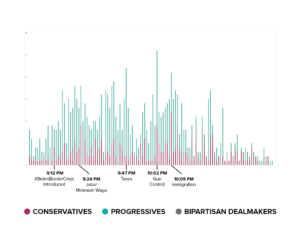
Bipartisan “would-be” Dealmakers play it safe:
Bipartisan Dealmakers heard meaningful outreach from the President in his continuing search for bipartisan lawmaking, but they didn’t bite on any of the specific proposals he laid out. Moderate members tweeted less and mostly returned to safer, more nonpartisan rhetoric in response, rather than highlighting places for potential agreement.
So what does this mean? It could mean that these Bipartisan Dealmakers are keeping their powder dry in an attempt to forge compromise. But based on what we saw last night: it likely suggests that the hill to climb to a bipartisan deal is steep as Washington turns from the speech to the effort to pass the American Jobs Act and American Family Act.
Where’s the proof? While these electeds mostly held back during the speech on Twitter, they came out swinging in the media afterwards:
- “You have pretty expansive spending…with the only way to pay for it, is to go after taxes. I think it makes it very difficult for it to be truly bipartisan,” Senator Lisa Murkowski, a key target for bipartisanship, said after the address.
- And Senator Mitt Romney, another key target, told reporters, “$6 trillion and counting. I’m sure Bernie is happy.”
Progressives are loud, across wide range of issues:
From racial justice and child care to climate and health care, Progressives covered the widest range of issues. No single issue emerged as a widely held, clear priority. Not surprisingly, the overall sentiment was extremely positive and they generated the most tweets and more engagement than Conservatives or Bipartisan Dealmakers did. Of the total tweets for the day of the speech, Progressives accounted for 58.2%, while Conservatives were at 23.2% and Bipartisan Dealmakers at 18.5%.
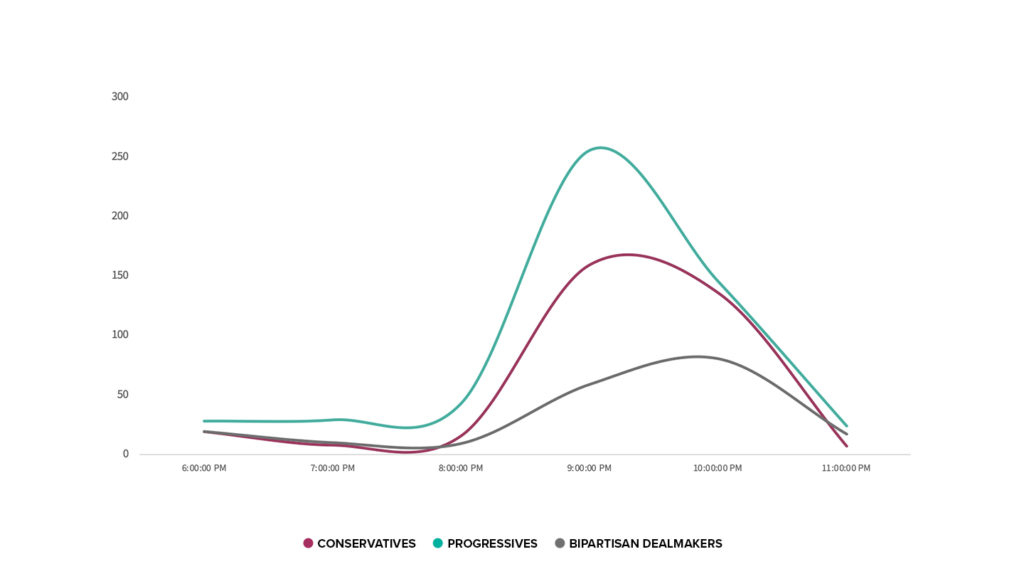
The tweet that traveled further than any other in the three groupings was Congresswoman Alexandria Ocasio-Cortez’s tweet praising progressive activism, which generated more than 91,000 likes and almost 10,000 retweets.
Conservatives are disciplined:
Conservatives focused on a few core issues — immigration, border security, taxes, and jobs – but largely stuck to painting the entirety of the agenda as radical. Conservatives clearly made three strategic decisions: 1) to oppose the Biden agenda; 2) to refrain from criticizing hugely popular items like President Biden’s infrastructure or paid family leave proposals and 3) to largely not defend corporations or the top 1% against tax increases.
Instead, they focused on the “border crisis” — even getting #BidenBorderCrisis to trend among Conservatives on Twitter — and the loss of fossil-fuel energy jobs due to new climate investments in the infrastructure proposal. Ultimately, the biggest hand they played is an old one: they painted everything as radical, and will continue to hope against hope that it sticks to President Biden.
Here’s an example from Senator Cornyn dubbing President Biden as “not so moderate:”
One Fun Thing: Congressional Emojis
Members of Congress used emojis to punctuate their Twitter commentary, distilling how they felt about the speech into one punchy visual.
- 👏 👏 👏 Progressives clapped their hands, expressing support and applause for the President’s plans and statements.
- 🇺🇸 🚨 ❌ Conservatives wrapped themselves in the flag and used alarms and X’s to express opposition to the President’s speech.
- ➡️ ✅ 👉 Bipartisan Dealmakers used arrows, checkmarks, and pointed fingers to emphasize key points from the speech and underscore policy positions.
Methodology
Precision conducted a social listening analysis of congressional retweets and tweets posted from 12am-11:30pmET on the day of President Biden’s Address to the Joint Session of Congress. We focused on three core groupings of members:
- Progressives: Members of the House Congressional Progressive Caucus and key progressive Senators, including Cory Booker (D-NJ), Sherrod Brown (D-OH), Tammy Duckworth (D-IL), Kirsten Gillibrand (D-NY), Ed Markey (D-MA), Jeff Merkley (D-OR), Chris Murphy (D-CT), Jon Ossoff (D-GA), Bernie Sanders (I-VT), Brian Schatz (D-HI), and Elizabeth Warren (D-MA).
- Conservatives: Members of the House Freedom Caucus and key conservative Senators, including John Barrasso (R-WY), Marsha Blackburn (R-TN), John Cornyn (R-TX), Tom Cotton (R-AR), Ted Cruz (R-TX), Josh Hawley (R-MO), Mike Lee (R-UT), Rand Paul (R-KY), and Rick Scott (R-FL).
- Bipartisan Dealmakers: Members of the Congressional Problem Solvers Caucus and Senate Gang of 20.
We assessed posts from their official Congressional handles, personal handles, campaign handles, and press handles. Our assessment included segmentation of Congress by caucus and ideology, NLP analysis of text posted to Twitter, development of dictionaries and labeling categories, topic cluster mapping, scattertext plotting, and the data visualizations.
In total, we analyzed over two million general population posts, plus 5,719 posts from 672 Congressional handles to determine which themes from Biden’s speech resonated most with our audiences. That includes 1598 tweets from 194 Congressional Progressives accounts, 639 tweets from 115 Congressional Conservative accounts, and 509 tweets from 139 Congressional Bipartisan Dealmakers.
